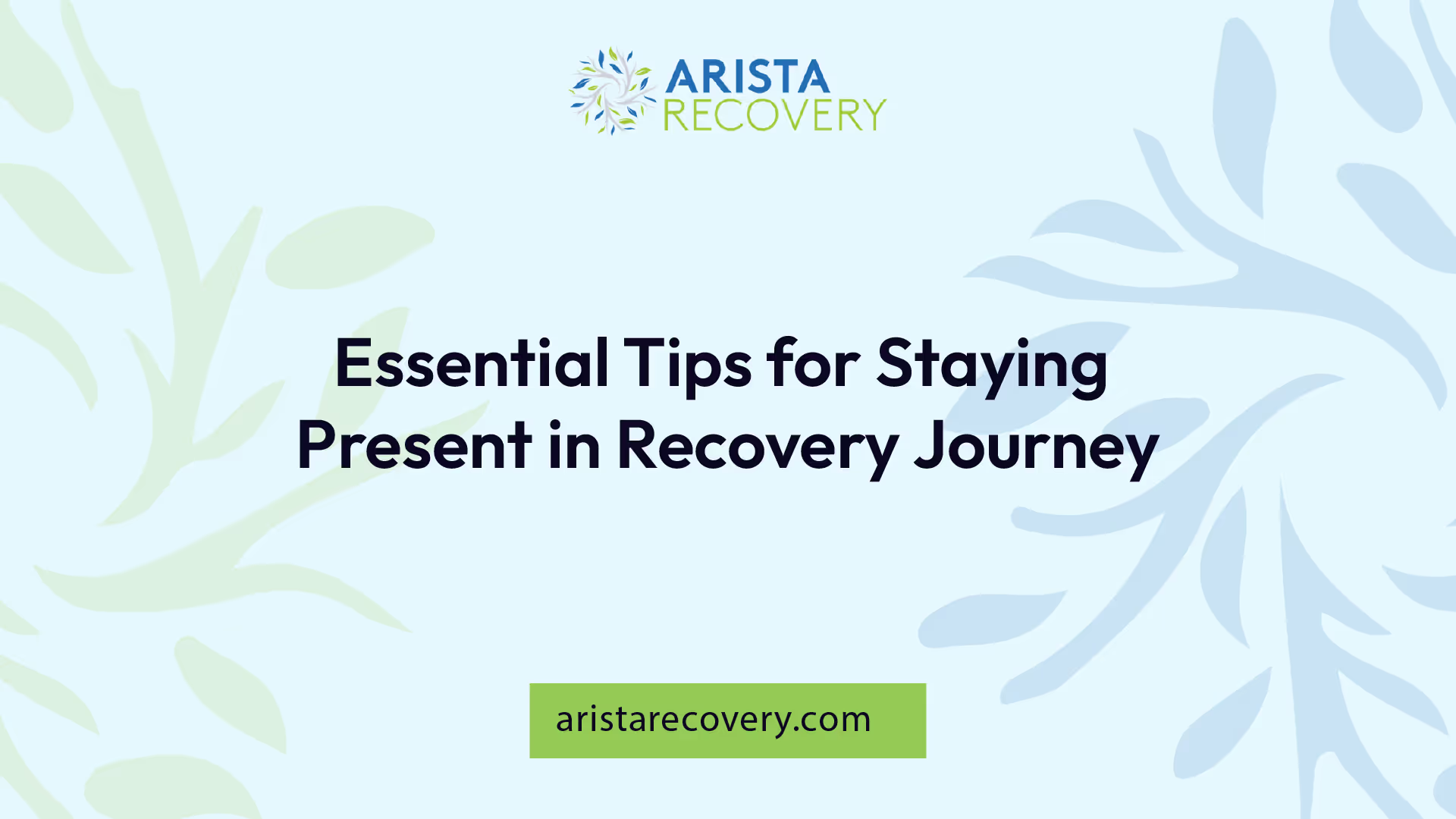Essential Tips for Staying Present in Recovery Journey


Embracing the Present Moment
Maintaining a focus on the present moment is essential for individuals navigating the complexities of recovery. Embracing mindfulness can significantly enhance this journey, providing tools to combat the various challenges that arise.
The Power of Mindfulness
Mindfulness empowers individuals to stay engaged with their current experiences, allowing them to cope with overwhelming emotions, cravings, and reckless urges. It involves techniques such as mindful breathing, meditation, and body scans, which facilitate attention on the present moment and encourage inner stillness and self-control [1]. By practicing mindfulness, one can achieve improvements in mental health, including reduced stress and emotional reactivity. Studies have shown that mindfulness is associated with various psychological benefits, underscoring its importance in the recovery process.
Benefits of MindfulnessEvidenceReduced ruminationStudies indicate a decrease in negative thought patternsLowered stress levelsResearch shows significant reductions in stress amongst practitionersEnhanced emotional regulationMindfulness contributes to better control over emotional responsesImprovements in psychological well-beingSelf-reported benefits in mental health quality
Benefits of Staying Present
Staying present in recovery offers several vital advantages. Mindfulness not only helps manage challenges associated with addiction but also promotes a greater connection with oneself and others. It enhances well-being by reducing mental clutter, allowing one to focus on immediate feelings and needs rather than dwelling on the past or worrying about the future.
Practicing mindfulness has been shown to be effective in treating depression and anxiety disorders. Mindfulness-based interventions lead to better outcomes compared to standard treatments and some active therapies, potentially even outperforming certain medications [1].
In addition to emotional management, staying present allows individuals to cultivate gratitude, fostering a positive mindset that aids in the recovery journey. Engaging in techniques for mindfulness and practicing gratitude can enhance overall satisfaction with life, making it easier to navigate the ups and downs of recovery. For further insights on this approach, consider exploring sections on practicing gratitude in recovery and staying sober one day at a time.
Challenges in Recovery
Recovery from addiction is a complex journey, and individuals often encounter various challenges that can impede their progress. Two significant obstacles are emotional overwhelm and denial and escape behaviors. Addressing these issues is essential for staying present in the recovery journey.
Emotional Overwhelm
Many individuals in recovery struggle with intense emotions, which can make it difficult to remain focused and present. Difficult feelings such as shame, grief, anger, and stress often surface during this time [2]. Those who have experienced trauma may also distance themselves from others, turning to substance use to cope with unmet emotional needs. This distancing can create distrust in future relationships, making it even harder to manage emotions effectively [3].
Finding healthy coping mechanisms is key to managing emotional overwhelm. Implementing daily commitments, such as sobriety pledges and small, realistic goals, can empower individuals to focus on achievable steps during their recovery. This helps foster feelings of accomplishment and reduces the sense of being overwhelmed [4].
Emotional ChallengeDescriptionShameFeelings of guilt or inadequacy associated with past actions.GriefLoss of life experiences or relationships, often tied to addiction.AngerFrustration that may result from past experiences and setbacks.StressAnxiety about the future or current life situations.
Denial and Escape Behaviors
Denial plays a significant role in hindering the recovery process. Individuals often use substances as a way to escape from reality, leading to separation from current problems and situations [3]. This behavior can create barriers to addressing the very issues that need attention for successful recovery.
Denial manifests in various forms, including rationalizing substance use or refusing to acknowledge the consequences associated with addiction. To combat these tendencies, it is vital for individuals to cultivate awareness by focusing on the present and recognizing their feelings and thoughts as part of their recovery journey.
Creating a supportive environment is crucial for overcoming denial and escape behaviors. Surrounding oneself with positive influences, whether through support groups or therapy, can provide encouragement and accountability, helping individuals stay committed to their recovery goals.
By recognizing emotional overwhelm and escape behaviors, individuals can better navigate the challenges of recovery. Emphasizing a daily focus rather than becoming consumed by past choices or future uncertainties helps build resilience and fosters growth on the path to lasting sobriety. For additional support in this journey, consider exploring daily reflections in recovery and practicing gratitude in recovery.
Importance of One Day at a Time
Understanding the significance of living in the present moment is crucial in the recovery journey. This approach emphasizes the concept of taking life one day at a time, focusing on progress and development while managing the challenges of addiction.
Focusing on Daily Progress
The philosophy of "one day at a time in recovery" encourages individuals to concentrate on the daily steps that lead to sobriety. By setting small, achievable goals, individuals can experience a sense of accomplishment without feeling overwhelmed by the bigger picture. This method promotes resilience, self-compassion, and confidence in managing sobriety, allowing the individual to recognize daily successes and build on them.
Daily GoalsBenefitsJournal a daily reflectionEnhances self-awareness and accountabilityAttend a support group meetingBuilds community and support systemsPractice mindfulness techniquesReduces stress and reinforces staying presentEngage in a healthy activity (e.g., exercise)Boosts mood and physical well-being
By focusing on daily progress, individuals can shift their attention away from potential challenges ahead and instead cultivate positive habits that support their recovery [5].
Coping Skills Development
Coping skills are essential tools that support recovery from addiction. Continuous learning and growth, including understanding addiction and developing mechanisms to deal with stressors, are crucial for navigating the journey successfully [6].
Developing effective coping skills involves identifying triggers and developing strategies to handle stress. Incorporating techniques such as mindfulness practices or practicing gratitude can increase emotional resilience and contribute to long-term sobriety. For instance:
Coping SkillsTechniquesStress ManagementDeep breathing, meditation, mindfulness exercisesSocial SupportBuilding healthy relationships with friends and familyRelapse PreventionCreating a plan for managing triggers and cravingsEmotional RegulationJournaling, seeking therapy, practicing self-care
Building and enhancing these coping skills can equip individuals to make informed decisions, manage challenges, and ultimately support their recovery [7]. Adopting the "one day at a time" approach allows individuals to address issues as they arise, fostering a sense of control and empowerment in their recovery journey.
Tools for Living in the Present
In the context of recovery, utilizing effective tools for staying present is vital. These tools can help individuals overcome challenges, manage cravings, and maintain focus on their recovery journey. Two powerful tools include mindfulness practices and setting realistic goals.
Mindfulness Practices
Mindfulness practices play a crucial role in aiding individuals during their recovery from addiction. These techniques can help manage overwhelming emotions, cravings, and reckless urges that are commonly faced during this journey [1].
Some effective mindfulness techniques include:
Research indicates that mindfulness is linked to improvements in psychological health, reduced rumination, stress, and emotional reactivity. Furthermore, mindfulness-based meditation has been shown to be effective in treating depression and anxiety disorders, often yielding better outcomes than some active therapies or even antidepressants.
Incorporating mindfulness into daily life can be an essential part of staying present in the recovery journey.
Setting Realistic Goals
Setting realistic goals is another essential strategy for individuals in recovery. Creating achievable objectives helps individuals focus on daily progress rather than feeling overwhelmed by long-term expectations. Effective goal setting can lead to a sense of accomplishment and motivation.
To set realistic goals, consider the following steps:
By concentrating on short-term goals and gradually achieving them, individuals can foster a sense of control and confidence as they navigate their journey of staying sober one day at a time.
Incorporating both mindfulness practices and realistic goal setting can significantly aid individuals in maintaining focus and resilience throughout their recovery process. For further insights, individuals may benefit from daily reflections in recovery and exploring practicing gratitude in recovery.
Building Support Networks
Creating a robust support network plays a crucial role in the recovery journey. Individuals with addiction problems benefit significantly from connecting with others who understand their experiences. This section explores the role of support systems and the importance of peer and professional guidance in maintaining sobriety.
Role of Support Systems
Support systems for individuals in recovery include friends, family, counselors, recovery groups, and sponsors. These networks provide emotional backing, accountability, and encouragement. Having a reliable support system helps to foster an environment where individuals can thrive and move forward in their recovery.
Research shows that social support networks significantly impact recovery outcomes. Those with strong networks experience enhanced engagement in treatment and lower relapse rates. Access to resources and guidance helps individuals effectively navigate recovery challenges.
Type of SupportBenefitsFriends & FamilyEmotional support, encouragement, and understandingCounselorsProfessional guidance and coping strategiesSupport GroupsSharing experiences and reducing isolationSponsorsAccountability and goal orientation
Peer and Professional Guidance
Peer and professional guidance are vital components of a solid support network. Recovery coaches and sponsors provide ongoing support, helping individuals remain focused on their sobriety goals. Regular communication with these mentors enables individuals to navigate obstacles and maintain their motivation throughout their journey [7].
Being part of a structured recovery community, such as support groups, enhances individuals' experiences. These groups allow for shared learning and strategy development, which is beneficial for personal growth and overcoming challenges. Engaging with others in similar situations reinforces feelings of unity and belonging, making it easier to stay present in the recovery journey.
As individuals cultivate their support networks, they can incorporate methods such as mindfulness in addiction recovery and practicing gratitude in recovery to deepen their connections. Establishing and participating in these pivotal relationships enhances one's ability to stay sober one day at a time.
Strategies for Long-Term Sobriety
Achieving and maintaining long-term sobriety requires the adoption of specific lifestyle changes and positive choices. By focusing on these strategies, individuals can enhance their recovery journey and cultivate a healthier, more satisfying life free from addiction.
Lifestyle Changes
Making significant lifestyle changes is essential for creating an environment that supports sobriety. Recovery involves developing a new life where it is easier not to use substances, as these changes address the underlying factors contributing to addiction [8].
Individuals can implement several key lifestyle changes, including:
The following table summarizes beneficial lifestyle changes:
Lifestyle ChangeDescriptionEstablishing a routineHelps create a stable environmentAvoiding triggersMinimizes relapse risk by staying away from temptationsImplementing daily commitmentsFosters motivation through small, achievable goals
Positive Lifestyle Choices
Making positive lifestyle choices is equally important in the recovery journey. These choices can empower individuals to focus on manageable steps and reinforce their commitment to staying sober. Key choices include:
The table below outlines examples of positive lifestyle choices:
Positive Lifestyle ChoiceBenefitsPracticing mindfulnessEnhances stress management and self-awarenessDeveloping coping skillsProvides tools to navigate challengesPrioritizing self-careImproves overall well-being and strengthens commitment
Focusing on these lifestyle changes and positive choices can help individuals remain present in their recovery journey and work towards a brighter, sober future. Strategies such as daily reflections in recovery and practicing gratitude in recovery can further support this effort as they cultivate a mindset geared towards hope and growth. To learn more, explore how staying sober one day at a time contributes to effective and sustainable recovery.
References
[2]:
[3]:
[4]:
[5]:
[6]:
[7]:
[8]:
[9]:
You’re not alone in this.
When mental health challenges and addiction intersect, it can feel isolating. At Arista, we offer compassionate, evidence-based, and trauma-informed care to help you heal, grow, and move forward.
You’re not alone in this.
When mental health challenges and addiction intersect, it can feel isolating. At Arista, we offer compassionate, evidence-based, and trauma-informed care to help you heal, grow, and move forward.
Support that moves with you.
You’ve taken a brave first step. At Arista Recovery, we’re here to help you continue with best-in-class care designed for long-term healing and support.
.webp)






